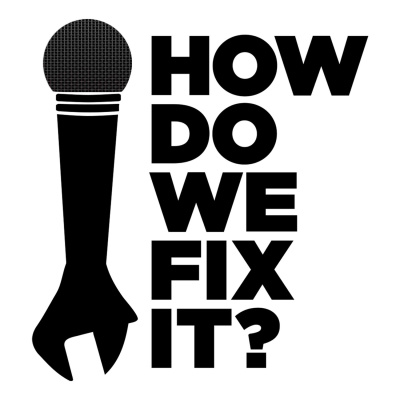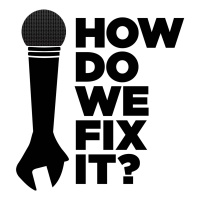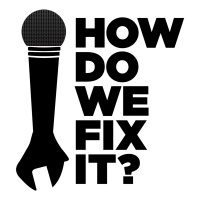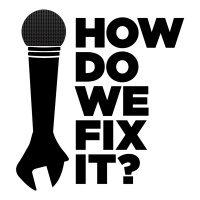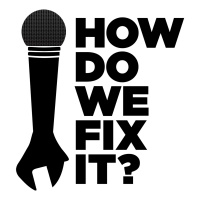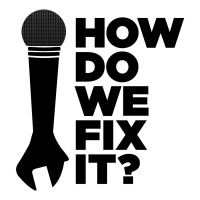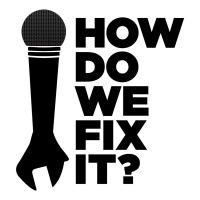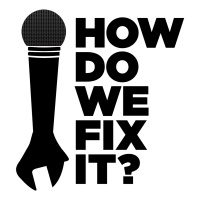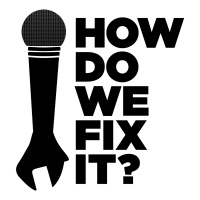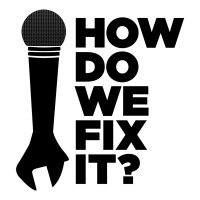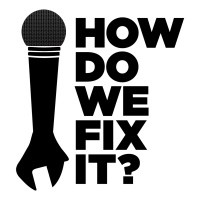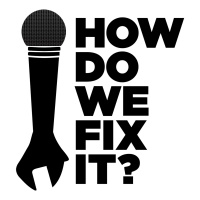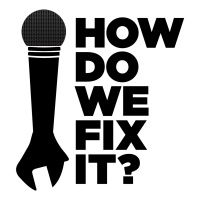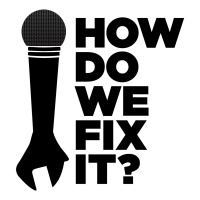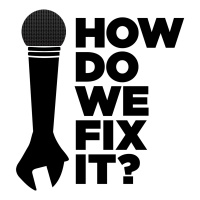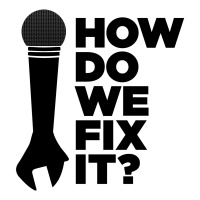Synopsis
From politics to the personal, we're about solutions. Our weekly podcast features two friends and longtime journalists. Join Richard Davies (ABC News) and Jim Meigs (Popular Mechanics) as they challenge authors, experts and provocateurs in a search for positive, practical ideas. Guests include Alan Dershowitz, a noted legal scholar and defender of civil liberties; Mike Rowe of "Dirty Jobs" and Lenore Skenazy, founder of "Free Range Kids." Topics include politics, parenting, personal finance, human behavior and much more. "How Do We Fix It?" - a repair manual for the real world. Produced by DaviesContent
Episodes
-
American Isolationism and the Fall of Afghanistan. Charles Kupchan
27/08/2021 Duration: 27minFor much of its history, the United States kept the rest of the world at arm's length. What happened in the decades after the 1941 military strike on Pearl Harbor, and several years after the 9/11 attacks, could be seen as an aberration.The sudden, chaotic withdrawal from Afghanistan, the Taliban takeover, and resulting humanitarian disaster may lead to another American foreign policy shift, plus a far greater reluctance to deploy U.S. forces overseas. While isolationism is derided by policy experts and global elites, this movement has a surprisingly enduring legacy. We examine it here.Charles Kupchan is a professor of international relations at Georgetown University and a Senior Fellow at the Council on Foreign Relations. "Isolationism: A History of America’s Efforts to Shield Itself from the World" is his most recent book. We share extracts from an interview with Charles by Justin Kempf, host of the Democracy Group podcast, "Democra
-
Identity Politics: Dignity and Resentment. Francis Fukuyama
13/08/2021 Duration: 27minSuccessful politicians on the right and left often use anger and resentment to build support for their campaigns. "A lot of our politics is dignity politics," argues Stanford political scientist, Francis Fukuyama, our guest in this episode. "It's one group saying, 'look, you are not taking us seriously. You disregard our rights and we demand a different kind of world.'"We discuss whether identity politics are damaging our democracy at a time of deep polarization when many national and global institutions struggle to respond to growing challenges. "We have shifted from arguing about economic policies to arguing about identities," Fukuyama tells us. In his book, "Identity: The Demand for Dignity and The Politics of Resentment," he warns that unless we forge a clear understanding of human dignity, we will doom ourselves to continuing conflict. We discuss other solutions, including the need for more civics education, national service, and the benefits of universal healthcare and other policies that help
-
#315 Living Better With COVID: 6 Fixes. Hosts Jim and Richard
06/08/2021 Duration: 28minIn this special episode, Richard and Jim have an extended conversation around six solutions to help us manage the pandemic more successfully, and improve responses to future public health emergencies.1. Have a more realistic view of the virus. This includes understanding that the virus won't go away anytime soon. Clear, honest communication from the media and government health officials will help. 2. Restoring Trust. Greater transparency by public health officials and honesty about what is not known are two ways to improve understanding and trust.3. Improve access to care and medical literacy. 4. Focus on the severe cost of the pandemic to children. 5. Make it Harder for People to be Unvaccinated.Over 95% of new COVID-related hospital cases are among unvaccinated Americans.6. COVID will probably increase life expectancy: The virus has led to advances in mRNA vaccines and viral medicine. The pandemic will speed up and intensif
-
Reading is Vital for Democracy: Joseph Luzzi
29/07/2021 Duration: 22minAmerica is facing a reading crisis, and this has profound impacts on how we engage with the world. The number of adults who read books for pleasure fell by more than 30% in less than 15 years. Researchers found that Americans watch TV three hours a day, but spend less than 30 minutes reading. "Reading is seeing the world through someone else's eyes," says our guest, Joseph Luzzi, Professor of Comparative Literature at Bard College. "I think of social media as a mirror. You look into it and your tastes and interests are reflected back on you. Literature is a prism. You look into it and you are engaged." Recent neuroscience research suggests fiction literature helps people develop empathy and critical thinking. The decline in reading and the popularity of social media may have profound impacts on democracy, feeding into our deep partisan division, and reinforcing extreme opinions.In this episode, we also discuss how reading Dante helped save Joseph after he became a widow
-
Fix More, Waste Less. Right to Repair. Sandra Goldmark
23/07/2021 Duration: 27minOur relationship with our stuff is broken. What was once fixed is often tossed into landfills. Repairs today are more expensive than the prices of many new clothes, gadgets, and household appliances.The U.S. has 5% of the world's population, but consumes about 30% of the world's resources and creates almost a third of the world's waste. Large manufacturers restrict the repair of their goods by limiting the availability of parts and repair information. Their policies sparked a consumer backlash and a growing right-to-repair movement. This week, The Federal Trade Commission said it wants to give consumers new rights to fix devices and limit "unfair anti-competitive restrictions" by manufacturers.Our guest, Sandra Goldmark, is a leader in the movement to demand better “stuff.” She doesn’t just want to help us clear away clutter—she aims to move us away from a throwaway culture, to teach us to reuse and repurpose more thoughtfully. We discuss her new book, "Fixation: How to Have
-
Defending The Constitution of Knowledge: Jonathan Rauch
16/07/2021 Duration: 33minDemocracies around the world are under threat from populist movements, demagogues, and dogmatic extremists who use disinformation, conspiracy theories, shaming, cancel culture, and other tactics to weaponize social media and challenge our ability to distinguish fact from fiction and truth from falsehood.In his new book, our guest, best-selling author, journalist, scholar, and public intellectual, Jonathan Rauch, offers a stirring defense of the constitution of knowledge— our social system of checks and balances that is crucial for turning disagreement into truth."This global network of people hunting for each others' errors is far and away the greatest human technology ever invented," Jonathan tells us in this episode of "How Do We Fix It?" The constitution of knowledge, he says, "is a global conversation of people looking for truth, and more especially, looking for the error."With a deep knowledge of history and politics, Jonathan arms listeners and readers with a bett
-
Delta Variant & Vaccine Hesitancy: Dr. Wrenetha Julion
09/07/2021 Duration: 27minThe spread of the Delta Variant is a rapidly growing threat to public health, especially in states with low vaccination rates. But cases of COVID-19 are still holding steady in regions where more than 60% of the adult population had at least one shot.The disparity comes at a time of triumph with increasing evidence that the vaccines offer extremely high rates of protection. Dr. Anthony Fauci, Director of the National Institute of Allergy and Infectious Diseases, warned that regional differences in coronavirus vaccination rates could create "two types of America."Vaccine hesitancy is high in rural red states, in Black and Latino communities, and among many young people. In this episode, we hear again from Dr. Wrenetha Julion, professor and Associate Dean for Equity and Inclusion at Rush University College of Nursing in Chicago. We also review the latest research on the Delta Variant and warnings of rising hospitalizations among unvaccinated
-
Heat, Drought, Fires : Alastair Gee and Dani Anguiano
25/06/2021 Duration: 27minMuch of the West has just lived through one of the worst June heatwaves in decades. Many states could be in a drought all this summer. From California and Arizona to the mountain West, dangerous heatwaves are almost becoming the norm.The threat of more devastating wildfires prompted calls for reforms of the nation's fire management policies, and are a clear sign that the impacts of climate change are now being felt.We discuss the causes of raging wildfires, including forestry management, climate, and the movement of people, as well as practical steps that can be taken now to reduce the destruction to property and people's lives. Our guests are Guardian journalists Alastair Gee and Dani Anguiano, authors of the book, “Fire In Paradise: An American Tragedy", a harrowing account of the most destructive wildfire in a century. Both Dani and Alastair reported extensively on the Camp Fire in 2018, and this year's megafires in California, Oregon, and Washington.Recommendation: Jim continues t
-
Free The Children. Lenore Skenazy
18/06/2021 Duration: 28min"Why I Let My 9-Year-Old Ride the Subway Alone" was a 2008 newspaper column that turned into a national campaign to help parents raise their children with less anxiety while pushing back against our culture that has become obsessed with kids' fragility.Our guest, Lenore Skenazy, founded free-range kids in the years after she first described making the decision to let her son, Izzy, take the New York City subway home alone. Her column resulted in a flood of media coverage and mixed reactions from parents— from accusations of child abuse to fond memories of childhood freedom. She hosted a TV series, "World's Worst Mom".This week, the second edition of her best-selling book, "Free-Range Kids: How Parents and Teachers Can Let Go and Let Grow", is published. In this episode, we discuss how parents and educators can step back so kids step up. We also look at the resilience of children and why the rest of the world is laughing at us scaredy-cat Americans. "The
-
America Talks #ListenFirst. Kristin Hansen and Zoë Jenkins
09/06/2021 Duration: 26minAmerica's remarkable experiment in a pluralist democracy is under threat from toxic polarization. In this episode, we discuss two current nationwide campaigns to tackle this crisis head-on,America Talks, on Saturday-Sunday, June 12-13, is a powerful conversation event that invites thousands of Americans to connect one-on-one on video across our political divides. By doing so, we remind ourselves that the “other” is – just like us – a person with family, friends, hopes, fears, values, beliefs, and intrinsic worth.The fourth annual National Week of Conversation, June 14-20, organized by #ListenFirst Coalition and over 300 organizations, invites Americans of all views and backgrounds to listen and discover common interests. Sign up for both events at AmericaTalks.us.Our guests are Kristin Hansen, Executive Director of Civic Health Project, Director at AllSides, and 17-year-old Zoë Jenkins, a civic activist who founded DICCE — diversity, inclusion, cultu
-
Frontlines of Peace. Séverine Autesserre
04/06/2021 Duration: 27minThe word “peacebuilding” evokes a story we’ve all heard over and over: Violence breaks out, foreign nations react, peacekeepers and million-dollar donors come rushing in, warring parties sign a peace agreement, and, sadly, within months the situation is back to where it started—sometimes worse. But peace can grow in the most unlikely circumstances. What are some strategies that work?Our guest is an award-winning researcher and peacebuilder, Séverine Autesserre, author of the new book, "The Frontlines of Peace". She shares success stories — innovative grassroots initiatives led by local people, at times supported by foreigners, often employing methods shunned by the international elite. In this episode, we look at examples of local initiatives that build lasting peace. We examine how they differ from the top-down "Peace Inc." approach that can waste billions of dollars in aid and involve massive international interventions.Séverine shows the radical c
-
Tough Lessons From Economics. Veronique de Rugy
28/05/2021 Duration: 38min"We should be humble all the time," says Veronique de Rugy of her study of economics. "There's always something I realize that I didn't understand." In this episode, we discuss the rigorous questions economists need to ask themselves when analyzing the likely impacts of public policies: Questions rarely asked by politicians and others in the public square. We look at the perils of cronyism, the shortcomings of the Ex-Im Bank, growing federal budget deficits, and the unfairness of the highly complex U.S. tax system.Veronique is a senior research fellow at the Mercatus Center at George Mason University. She writes a syndicated column looking at economics from a free market, libertarian perspective.Featured quote: "People don't go to the barricades to fight for distortions and economic inefficiency but they should go to the barricades to fight unfairness and cronyism that is unfair."Recommendation: Jim is listening to "The Moment", a podcast with interviews
-
Ancient Wisdom for Modern Times. Eric Weiner
21/05/2021 Duration: 24minIt's tempting to believe that our current moment is the most urgent of all. Yet despite the catastrophic pandemic, and threats from other urgent problems, humankind has faced worse calamities in the past— from global wars and plagues to economic collapse.In this episode, we look at age-old lessons from philosophy and discover how ancient wisdom can be our guide in modern times.Best-selling author, traveler, and former NPR foreign correspondent, Eric Weiner is our guide. He's the author of the recent book, "The Socrates Express: In Search of Life Lessons From Dead Philosophers".This episode is a fun ride, as we follow in the footsteps of history’s greatest thinkers—from Epicurus to Nietzsche, Thoreau to Gandhi— who show us practical and spiritual lessons for today’s unsettled times. Philosophy helps us during our struggle with disturbing questions raised by the pandemic: How can we remain calm in an uncertain age? How do we endure tough times? There
-
Bridging the Rural-Urban Divide. Ashley Ahearn
14/05/2021 Duration: 30minShe lived in Seattle and covered science, climate change, and the environment for NPR for more than a decade. Most of her friends and colleagues were liberals or progressives. Then in 2018, journalist Ashley Ahearn made a big jump, moving with her husband to one of the most conservative counties in rural Washington State. What did this public radio reporter learn from her dramatic change in lifestyle? In this episode, we learn about the profound rural-urban divide in America, and what Ashley discovered about her new neighbors and herself when she switched from the city to the country, now living on a 20-acre property with a horse and a pickup truck. We also discuss how politics and views of the land and climate differ greatly according to where people live.Recently, Ashley Ahearn launched her remarkable 8-part podcast series, Grouse, which looks at life in rural America through the lens of the most controversial bird in the West — the greater sage-grouse. This podcast series is
-
Framing is Fundamental. Francis de Véricourt and Kenneth Cukier
07/05/2021 Duration: 27minToo often in our fierce and narrow political debates, we suffer from a poverty of imagination. Seeing a crisis through a narrow lens of "us versus them" is a barrier to creative solutions and vital changes needed to save lives, protect the planet, and grow prosperity.In this episode we discuss the enormous power and potential of framing: mental models that enable us to see patterns, predict how things will unfold, and understand new situations.Our guests are Kenneth Cukier, a senior editor at The Economist in London, and Francis de Véricourt, professor of management science at the European School of Management and Technology in Berlin. They are two of the co-authors of the new book, "Framers. Human Advantage in an Age of Technology and Turmoil."Real-world examples of how framers changed the world include: The rapid rise of #MeToo, which went viral on Twitter after the actress Alyssa Milano tweeted a request to her followers: “If you’ve been sexually harassed o
-
Promoting Diversity, Defending Free Speech. Amna Khalid
30/04/2021 Duration: 33minIn the months after George Floyd’s murder, colleges, universities, non-profits, and large corporations across the country embraced anti-racism and diversity training as a way to promote inclusion and racial justice.But do these programs actually work to change minds and achieve their goals? Our guest, associate professor of History at Carleton College, Amna Khalid, argues that while training can improve customer service and knowledge of CPR and Excel spreadsheets, it’s woefully inadequate when confronting complex social problems such as poverty, inequality, discrimination, and racism. Amna grew up under several military dictatorships in Pakistan and came to the U.S. with a passionate commitment to free speech and belief in the power of education to promote curiosity, understanding, and imagination."Through all my journeys what I've come to realize is that people are individuals more than any category that you can put them into," Amna t
-
Good Conflict vs. High Conflict. Amanda Ripley
23/04/2021 Duration: 31minWhat’s the greatest crisis facing America today? — Racism and hate crimes, exploding government debt, climate change, or the mess at the border?It may be none of these. America and many other countries are trapped in high conflict. Both sides are paralyzed by fear and anger as they demonize the other. The national narrative of "us versus them" is a threat to democracy and stops us from working together to build a better world.Best-selling author and investigative journalist, Amanda Ripley, is our guest. She is well-known for her writing in The Atlantic, Time, The Guardian, The Wall Street Journal, and many other publications. Her latest book is “High Conflict: Why We Get Trapped and How We Get Out."Amanda argues that good conflict involves nuance and complexity. It can teach us to be better people, who are capable of solutions as they move past misunderstandings. Many are trapped in high conflict, which is threatening to tear us apart, creating an even deeper crisis than we have
-
Six years. Six guests. 300 episodes
16/04/2021 Duration: 29minWe’ve made it to our 300th weekly episode! While it’s easy to congratulate ourselves for being among the few podcasts to produce this many shows, Jim and Richard are most proud of our extraordinary range of guests.During our first six years together, we've often highlighted out-of-the-box thinkers, who share ideas that are too rarely discussed: People who speak about solutions through an independent lens— neither firmly left nor right. For this episode, we revisit interviews with six guests— or roughly 2% of all the people we've spoken with for "How Do We Fix It?" We begin with the public intellectual and problem solver Philip K. Howard, who was our very first guest. Others featured here are Claire Cain Miller of The Upshot at The New York Times, Mike Rowe, who became famous with the TV show "Dirty Jobs", science evangelist, Ainissa Ramirez, Jerry Taylor, President and Founder of The Niskanen Center, and R&B musician Daryl Dav
-
Fighting Hate and Self-Loathing With Love: Chloé Valdary
09/04/2021 Duration: 24minRecent mass shootings and the explosion of rage outside the U.S. Capitol on January 6 are reminders of threats posed to us all by anger, fear and loathing. On social media and in the hyper-partisan ways political issues are debated, many of us objectify others. Those who belong to the wrong tribe are often targets of personal scorn.In a Twitter post, our guest, writer and entrepreneur, Chloé Valdary, says: "if you do not possess the power to love, and especially love your enemies, then you don't really have the power."In this episode, first released in 2020, Chloé talks about her antiracism program, Theory of Enchantment, which uses the music and messaging of Beyoncé, Disney movies and pop culture as educational tools, teaching social and emotional learning in schools, and diversity and inclusion in companies and government agencies. The three key principles involve:1. We are human beings, not political abstractions.2. Use criticism to uplift, not tear down.3. Lead with love and
-
Infrastructure. How To Pay For It: Maya MacGuineas
02/04/2021 Duration: 28minStifle that yawn. Infrastructure just got exciting again.President Biden announced a $2 trillion plan to rebuild roads and rails, repair bridges, modernize airports and seaports, create hundreds of thousands of union jobs in the solar and wind power industries, boost housing, expand broadband access to regions that are poorly served, and speed-up the transition to a climate-friendly economy. Total spending on his proposals could be as much as $4 trillion over the next decade. We explain the President's ambitious plan, which amounts to the biggest spending initiatives in decades, and look at how to pay for it with one of the nation's top experts on the budget and taxes— Maya MacGuineas, President of the non-partisan Committee for a Responsible Federal Budget.Maya MacGuineas praises recent efforts to spend big on COVID relief, and also discusses ways to restore fiscal balance through reducing unproductive tax breaks, and reforming the tax code. "The bad news is that we had a m
